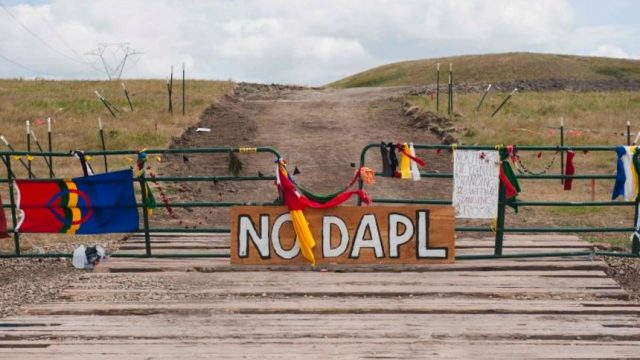Court Ruling in Favor of #NoDAPL Activists Illustrates Everything That’s Wrong With the Federal Regulatory Regime

Signs left by protesters demonstrating against the Energy Transfer Partners Dakota Access oil pipeline sit at the gate of a construction access road where construction has been stopped for several weeks due to the protests near the Standing Rock Sioux reservation in Cannon Ball, North Dakota, U.S. September 6, 2016. REUTERS/Andrew Cullen
Oil has been flowing through the much-contested Dakota Access Pipeline for about two months now. Energy Transfer Partners, which built the pipeline, achieved that goal after clearing years of regulatory hurdles and legal folderol.
But yesterday federal Judge James Boasberg issued a ruling that, while rejecting most of the legal arguments made against the pipeline by the Standing Rock Sioux Tribe and their allies, did question whether the U.S. Army Corps had fully complied with the National Environmental Policy Act when it allowed the pipeline to be completed.
“Although the [Army Corps of Engineers] substantially complied with [the National Environmental Policy Act] in many areas, the Court agrees that it did not adequately consider the impacts of an oil spill on fishing rights, hunting rights, or environmental justice, or the degree to which the pipeline’s effects are likely to be highly controversial,” Boasberg wrote. He went on to rule that “the Corps will have to reconsider those sections of its environmental analysis.”
For now oil will continue flowing through the pipeline, but one possible outcome of this is that the pipeline could be shut down. That seems unlikely at this point. Remember that Boasberg has consistently refused to enjoin construction or operation of the pipeline.
The Standing Rock tribe and their environmental extremist allies claiming “victory and vindication” is more than a little premature.
But let’s reflect on one important point in all of this: The legal battle here is not between the tribe and the pipeline company. The legal battle is between the tribe and the federal government. If the pipeline is shut down as a result of this legal maneuvering, which is extremely unlikely, it won’t be because Energy Transfer Partners made a mistake. It will be because the feds didn’t follow their own laws properly.
ETP would take it on the chin, of course. They would begin losing money the moment the oil stopped flowing, and it would be happening because the years-long regulatory process required of them by the federal government wasn’t executed properly by the federal government.
The regulatory regime surrounding pipelines has become so byzantine that apparently not even the bureaucrats responsible for implementing it can get it right.




